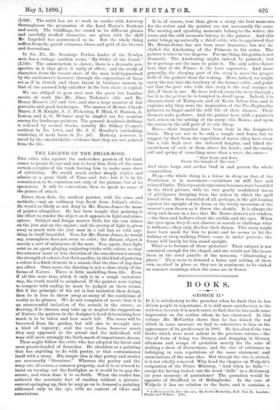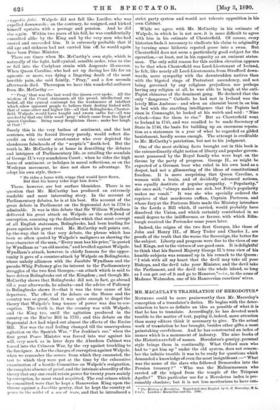BOOKS.
GEORGE II.*
IF it is satisfactory to the preacher when he finds that he has driven people to repentance, it is still more satisfactory to the reviewer, because it is much rarer, to find that he has made some impression on the author whom he has chastened. In this volume Mr. McCarthy shows that he has kissed the rod which in some measure we had to administer to him on the appearance of its predecessor in 1884. He has abated the two faults which were most salient in the previous vohune,—the vice of form of being too literary, and dragging in literary allusions and scraps of quotation merely for the sake of making a show of literariness ; and the vice of substance in indulging in vain repetitions of the same statement and enunciation of the same idea. But though the vice is abated, it is not wholly removed. Why head the chapter on Walpole's resignation of the Prime Ministry, " And when he falls,"— except for having looked out the word " falls " in a dictionary (or your memory) of quotations? The quotation would be apposite of Strafford or of Bolingbroke. In the case of Walpole it has no relation to the facts, and it contains a • A History of the Four Georges. By Justin McCarthy, M.P. Vol. II. London: Chatto and Windus. 1E90.
s uggestio falsi. Walpole did not fall like Lucifer, who was expelled downwards ; on the contrary, he resigned, and kicked himself upstairs with a peerage and pension. And he did rise again. Within two years of his fall, he was confidentially consulted alike by the King and by the very men who had ousted and succeeded him. It is extremely probable that if old age and sickness had not carried him off, he would again have been Prime Minister.
There are times when Mr. McCarthy's own style, which is naturally of the light, half-cynical, sensible order, tries to rise or fall into the Carlylean strain with desperate ill-success. When Queen Caroline, who had set up during her life for an agnostic or more, was dying a lingering death of the most horrible pain, she said faintly, " Pray," and a few seconds afterwards died. Thereupon we have this wonderful outburst from Mr. McCarthy :-
" Pray,' that was the last word the Queen ever spoke. All the wisdom of the Court statesmen, all the proud, intellectual un- belief, all the cynical contempt for the weaknesses of intellect which allow ignorant people to believe their destiny linked with that of some other and higher life—all that Bolingbroke, Chester- field, Walpole, would have taught and sworn oaths for—all was mocked by that one little word pray' which came from the lips of Queen Caroline. Bring saucy Scepticism there ; make her laugh at that "
Surely this is the very bathos of sentiment, and the last sentence, with its forced literary parody, would reflect dis- credit on the veriest street-ranter who ever depicted the slanderous falsehoods of the " sceptic's " death-bed. But the truth is, Mr. McCarthy is at home in describing the debates and intrigues of Parliamentary life, or retailing the scandals of George IL's very scandalous Court ; when he rides the high horse of sentiment. or indulges in moral reflections, as on the Wesleyan movement, he does not show to advantage. To adopt his own style, then-
" He rides a horse with wings that would have flown, But that his heavy rider kept him down."
These, however. are but surface blemishes. There is no question that Mr. McCarthy has produced an extremely readable and most interesting story. In the account of Parliamentary debates, he is at his best. His account of the
great debate in Parliament on the Septennial Act in 1734 is admirable. It was in this debate that Sir William Wyndham
delivered his great attack on Walpole as the arch-fiend of corruption, samming up the diatribes which that most corrupt of all English statesmen, Bolingbroke, had been hurling for years against his great rival. Mr. McCarthy well points out, by-the-way, that in that very debate, the phrase which has been so often quoted by Walpole's maligners as showing the true character of the man, "Every man has his price," is quoted by Wyndham as "an old maxim," and levelled against Walpole. Wyndham's attack, however, is chiefly famous for the oppor- tunity it gave of a counter-attack by Walpole on Bolingbroke, whose unholy alliances with the Jacobite Wyndham and the pseudo-Whig Pulteney give its interest to the Parliamentary struggles of the two first Georges,—an attack which is said to have driven Bolingbroke out of the Kingdom ; and though Mr. McCarthy shows that Bolingbroke did not, in fact, go abroad till a year afterwards, he admits—and the advice of Pulteney to Bolingbroke shows it—that it was the true cause of his departure. The effect of the debate on the House and the country was so great, that it was quite enough to dispel the theory that Walpole's long tenure of power was due to cor- ruption. The truth is, that the country was with Walpole, and the King too, until the agitation produced in the country on the Excise Bill in 1733 ; and this debate on the Septennial Act had wiped out almost the effects of the Excise Bill. Nor was the real feeling changed till the unscrupulous agitation on the Spanish War, "For Jenkins's ear," when the first great Peace Minister was forced into war against his will, very much as in later days the Aberdeen Cabinet was forced into the Crimean War, by the cry against truckling to the foreigner. As for the charges of corruption against Walpole, when we remember the source from which they emanated, the test to which they were put at the time by the exhaustive examination of a hostile Committee on Walpole's resignation, the complete absence of proof, and the intrinsic absurdity of the theory that any one could retain power for twenty years mainly by corruption, he must stand acquitted. The real crimes which
he committed were that he kept a Hanoverian King upon the throne against a Jacobite gentry, that he kept the country at peace in the midst of a sea of wars, and that he introduced a
strict party system and would not tolerate opposition in his own Cabinet.
While we agree with Mr. McCarthy in his estimate of Walpole, in which he is not new, it is more difficult to agree with him in his estimate of Chesterfield. Of course, every
historian finds it necessary to vindicate his claim to originality by turning some hitherto reputed goose into a swan. But
Chesterfield does not seem a particularly good subject for the operation,—at least, not in his capacity as an eminent states- man. The only solid reason for this sudden elevation appears to be that when Chesterfield was Lord-Lieutenant of Ireland, he felt, like nearly all Lord-Lieutenants, from Strafford down- wards, more sympathy with the downtrodden natives than with the bigoted rings of Protestant ascendency, and not being governed by any religious prejudices, nor perhaps having any religion at all, be was able to laugh at the anti- Papist chimeras of the dominant gang. He declared that the only " dangerous " Catholic he had met in Ireland was the lovely Miss Ambrose : and when an alarmist burst in on him in bed with the startling intelligence that the Papists had risen in Connaught, he looked at his watch and said : "Nine o'clock—time for them to rise." But as Chesterfield went to Ireland in 1745, and was recalled to be made Secretary of State in 1746, the basis for building up an enormous reputa- tion as a statesman in a year of what he regarded as gilded banishment, hardly seems enough. The attempt is creditable to Mr. McCarthy's patriotism, but not to his judgment.
One of the most striking facts brought out in this book is the extraordinarily slight notion of liberty and popular govern- ment possessed by the Royal family who were kept on the throne by the party of progress. George IL, as might be expected of a German boor who ruled in his own land as a despot, had not a glimmering of the ideas of constitutional freedom. It is more surprising that Queen Caroline, a woman with a brain, and of decidedly advanced notions, was equally destitute of popular sympathy. " Popularity," she once said, "always makes me sick, but Fritz's popularity makes me vomit." It was she who specially ordered the reprieve of that murderous ruffian, Captain Porteous, and whose fury at the Porteous Riots made the Ministry introduce in the Lords a Bill which, if carried, would probably have dissolved the Union, and which certainly contributed in no small degree to the indifference, or favour, with which Edin- burgh received the Pretender some years later.
Indeed, the reigns of the two first Georges, like those of John and Henry HE, of Mary Tudor and Charles I., are proofs of the troth that the worse the Sovereign, the better for the subject. Liberty and progress were due to the vices of our bad Kings, not to the virtues of our good ones. It is delightful to think that his Sacred Majesty George IL's true view of his humble subjects was summed up in his remark to the Queen: " I wish with all my heart that the devil may take all your Bishops, and the devil take your Minister, and the devil take the Parliament, and the devil take the whole island, so long as I can get out of it and go to Hanover,"—i.e., to the arms of Madame Walmoden, one of his Hanoverian courtiers' wives.







































 Previous page
Previous page